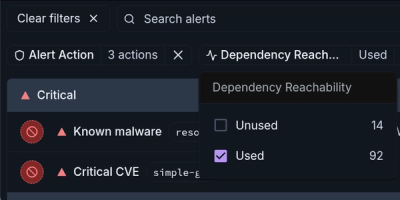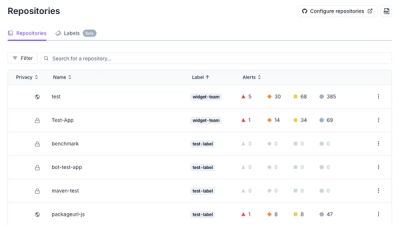
Product
Introducing Module Reachability: Focus on the Vulnerabilities That Matter
Module Reachability filters out unreachable CVEs so you can focus on vulnerabilities that actually matter to your application.
This project provides a streamlined pipeline for generating and handling molecular data, specifically for use in machine learning models. The toolkit involves generating SMILES representations, using ray tracing to create images, and preparing dataset indices for training, validation, and testing sets.
This repository contains several Python scripts that together form a pipeline for the generation and management of molecular data. Specifically, it includes:
gen_data/smile_generation.py: A script for generating SMILES representations of molecules. It requires a CSV file containing molecule data as input and produces a JSON file containing the generated SMILES strings.gen_data/ray_generation.py: A script that uses ray tracing to generate images of the molecules described by the SMILES strings. It has several options for customization, such as resolution, blur, and the use of motion blur and gaussian noise.gen_data/prepare_dataset.py: A script that creates indices for the generated molecules and splits them into training, validation, and testing sets. It creates JSON files containing these indices.The scripts are designed to be used in sequence, but can also be used independently if needed.
This project is written in Python and requires the following Python libraries:
Please note that Python > 3.10 is not supported (due to Ray).
"numpy>=1.16,<1.24",
"torch>=1.4.0",
"packaging",
"tqdm",
"scikit-learn",
"matplotlib",
"scipy",
"pandas",
"opencv-python",
"numba",
"rdkit",
"ray",
You can install these libraries using pip:
pip install SiPMai
or build from source:
Open your terminal and execute the following command:
git clone https://github.com/GilesLuo/SiPMai.git
cd SiPMai
python setup.py install
In a ternimal, do:
generate_pubchem
It will generate a 100k dataset for molecules with 39<=num_atom<=200 in the command execution directory.
You may modify the generation configuration by doing:
generate_pubchem --your_args
Please refer to SiPMai/gen_data/gen_all_data_pipeline.py for a complete list of arguments.
Equivalently, you can call the main() function directly from a python script, such as:
import SiPMai
from SiPMai.gen_data.gen_all_data_pipeline import gen_all_data, main
main() # generate with preset arguments
# or
from SimpTM.gen_data.gen_all_data_pipeline import gen_all
gen_all_data(many_args) # generate with user-defined arguments
MemoryError: Unable to allocate internal buffer.This is typically because our code, by default, use all your CPU cores for generation. You're trying to serialize is too large to fit into memory, or if your system is running low on available memory.
A simple fix is to set num_cpus properly. For example, you may use
generate_pubchem --num_cpus 4
We also provide a Pytorch DataLoader template to load the generated datasets. Details please refer to SiPMai/utils/dataloader.
More features are under development. Please feel free to raise issues and participate in developing this tool.
This project was made possible thanks to the contributions of the team members and the use of multiple open-source libraries.
This project is licensed under the MIT License - see the LICENSE file for details.
FAQs
A Simple Yet Effective Scanning Tunnel Microscope Image Simulator
We found that SiPMai demonstrated a healthy version release cadence and project activity because the last version was released less than a year ago. It has 3 open source maintainers collaborating on the project.
Did you know?

Socket for GitHub automatically highlights issues in each pull request and monitors the health of all your open source dependencies. Discover the contents of your packages and block harmful activity before you install or update your dependencies.

Product
Module Reachability filters out unreachable CVEs so you can focus on vulnerabilities that actually matter to your application.

Company News
Socket is bringing best-in-class reachability analysis into the platform — cutting false positives, accelerating triage, and cementing our place as the leader in software supply chain security.

Product
Socket is introducing a new way to organize repositories and apply repository-specific security policies.